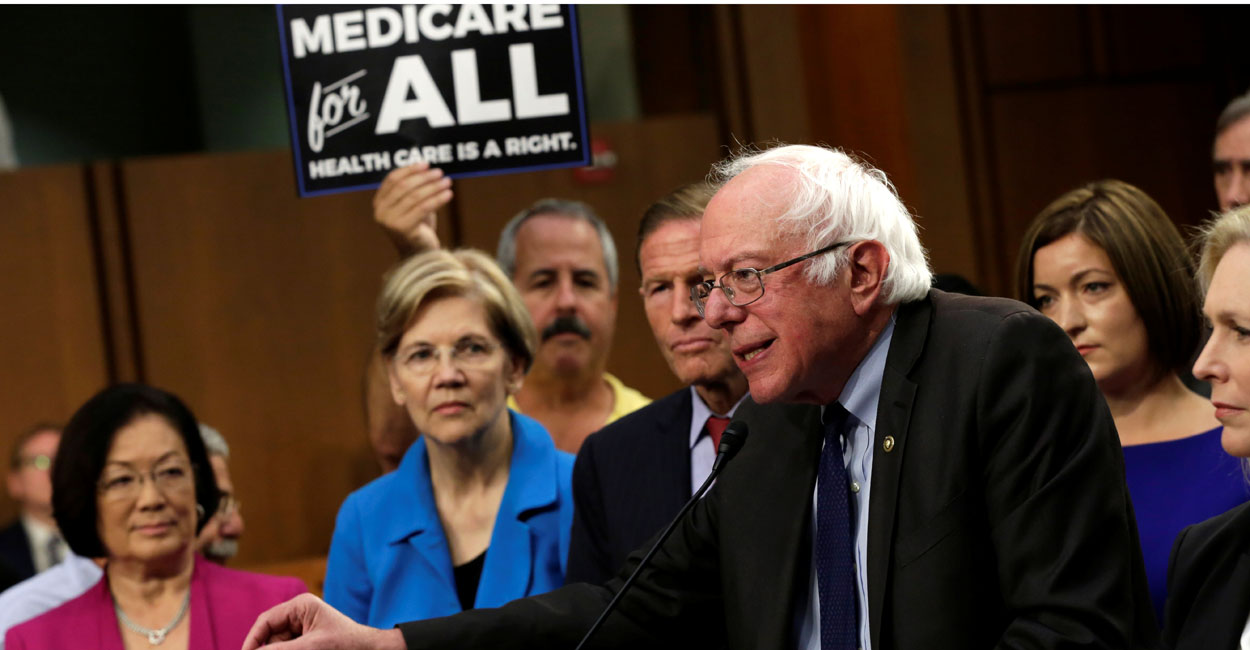The push for progressive liberal socialism for the Untied States is for exactly the same reasons that Venuenzlua brought socialism to it's population, it's for absolute control of the population and making themselves rich at the same time.
"Power tends to corrupt and absolute power corrupts absolutely."
Leaving the citizens without options for their lives is progressive socialism. The ''new wave'' democrats see this as an open window to gain an advantage that they don't have with Donald Trump as president and a Republican congress. Republicans believe in free markets and individual freedom. democrats know this will kill their drive for a socialist state.
Promising everything will be free if the voters elect them to office is not a winning strategy in this new age of social interaction. The election in 2016 has shown voters are not so easily duped as they have been in the past.
Still there are millions of people that lurk on the sidelines of the information boom relying on the old democrat media to keep them secure in their ignorance and voting like they are told.
"Power tends to corrupt and absolute power corrupts absolutely."
Leaving the citizens without options for their lives is progressive socialism. The ''new wave'' democrats see this as an open window to gain an advantage that they don't have with Donald Trump as president and a Republican congress. Republicans believe in free markets and individual freedom. democrats know this will kill their drive for a socialist state.
Promising everything will be free if the voters elect them to office is not a winning strategy in this new age of social interaction. The election in 2016 has shown voters are not so easily duped as they have been in the past.
Still there are millions of people that lurk on the sidelines of the information boom relying on the old democrat media to keep them secure in their ignorance and voting like they are told.
Government Economists Offer Window Into What a Socialist US Economy Would Look Like
If the United States were to adopt the socialist policies of Venezuela, the move would slash the economy by 40 percent—or $24,000 per year for the average American, according to a report by the president’s Council of Economic Advisers.
“Coincident with the 200th anniversary of Karl Marx’s birth, socialism is making a comeback in American political discourse,” says the council’s report, “The Opportunity Costs of Socialism.”
“Detailed policy proposals from self-declared socialists are gaining support in Congress and among much of the electorate,” the report continues.
The report specifically cites so-called “Medicare-for-all” proposals, which essentially would be a single-payer health care program. The study found that if Medicare-for-all were financed out of current federal spending—without additional borrowing or tax increases—it would eat up more than half of the entire federal budget.
That would require drastic cuts in Social Security and in national defense to pay for it, said Kevin Hassett, chairman of the president’s Council of Economic Advisers, told reporters in a conference call Tuesday.
Further, the report states, if the Medicare-for-all plan were financed through higher taxes, the gross domestic product would fall by 9 percent, or about $7,000 per person in 2022, because of the high tax rates that would reduce incentives to supply the factors of production.
Venezuela, where the economy is falling apart, is a profound example of what can happen under socialism, Hassett said.
“When you have a breakdown in the rule of law, and you take away private-property rights, it’s not unusual to have a pattern of destabilization,” he said. “When you undermine property rights, it undermines stability.”
Citing the worst examples, the report refers to Mao-era China, Cuba, and the Soviet Union, which nationalized the agriculture industry and caused tens of millions of deaths by starvation.
Asked about current-day China’s strong economic growth, Hassett said that’s due largely to a “hybrid” within its economy that allows private property and market forces in the parts of the economy that are most successful.
Even if the United States adopted the less-repressive socialist policies of Nordic countries—Sweden, Norway, Finland, Denmark and Iceland—it would mean a 15 percent lower standard of living, the council’s report says.
The Nordic countries in some areas are less regulated than the United States, the report says. “Marginal labor income-tax rates in the Nordic countries today are only somewhat higher than in the United States, and Nordic taxation overall is surprisingly less progressive than U.S. taxes,” the report says.
“However, the Nordic countries do regulate and tax labor markets somewhat more; thus, American families earning the average wage would be taxed $2,000 to $5,000 more per year net of transfers if the United States had current Nordic policies,” the report continues. “Living standards in the Nordic countries are at least 15 percent lower than in the United States.”
However, in the 1970s, the Nordic countries had more restrictive socialist policies. If the U.S. adopted the Nordic policies of that era, the gross domestic product would be about 20 percent lower, according to the council’s report.


No comments:
Post a Comment